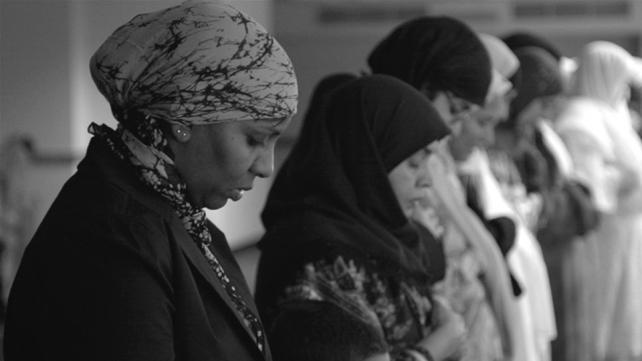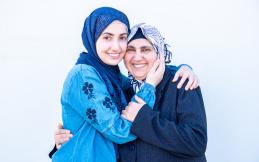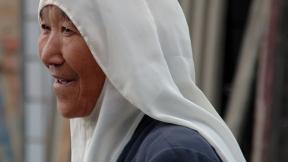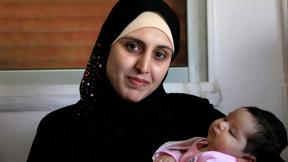
Last Friday, I was all set to give a Khutba about the need for Muslims to plan ahead on an individual and community level. My notes were ready and I was in full "Khutba mode". But before sermon time, I decided to change the topic completely -- to talk about the exclusion of Muslim women from the mosque and community life.
It wasn't an earth-shattering event that made me change the topic. It was an email. And it proved to be the proverbial straw that broke the camel's back. It was one of five emails I received last week about Islamic events with a clear "brothers only" statement. One notice for a regional conference even stated categorically that there was no space for women and children under 15 at the event.
But the emails were only part of the story. A week before, I had given a Khutba in another, brand-new mosque in the heart of Chicago. After the prayer, while in the elevator, I overheard four Muslim sisters speaking angrily about their experience in the Masjid.
"If I wanted to watch TV, I'd stay home," said one of the women, disgusted. I asked them what was wrong, and they told me how they could only see the Imam through a TV system set up in the women's section. Moreover, the space was inconvenient, uncomfortable and was changed twice that day. This was despite the fact that months ago, the leadership of this mosque had promised me that they would involve sisters in decision-making about how the women's space would be set up.
The Khutba
I was speaking in Chicago's oldest mosque where the main prayer hall accommodates about a thousand people. It has a small, curtained off space in the corner for about 40 or so women. Due to the sensitive nature of my topic, it did occur to me before the Khutba that I might not be invited to give a Friday sermon there in the future. Nonetheless, I made the following points and asked these questions:
Who decides how women's space in the mosque is allocated and organized?
How many women sit on the Board of Directors of our mosques?
If women are part of the Board of Directors, are they elected, chosen by women, selected by both men and women or are they simply the wives of male board members?
I also reminded the audience that in the Prophet's mosque, women could hear and see the Prophet Muhammad, peace and blessings are upon him, and later, the leaders of the Muslims (Khulafa) when they spoke from the pulpit. Actually there are reports of interaction with the Prophet when women raised questions. Caliph Omar even went back to give another sermon to withdraw his opinion when a women from the audience gave him critical feedback after his Khutba.
Moreover, when the Prophet felt that the women were too far away to hear or he had specific points to make, he would walk over to their section and present a Khutba for them.
Examples from Islamic history
Women in early Islamic history were active not just as "mothers and wives" but contributed as individual Muslim women in all aspects of the community.
On a scholarly level, there was Aisha, may God be pleased with her. She is credited with disseminating the knowledge of Islam and information about almost all aspects of Islamic life. Today, nearly half of the Islamic jurisprudence of the Hanafi school of thought (which is followed by about 70 percent of the Muslim world) comes through the students of Aisha alone.
On a political level, there was Umm Salama. During the signing of the Treaty of Hudaibiya, when none of the Muslim men agreed to forego Hajj due to the demands of the pagan Meccans, the Prophet consulted Umm Salama. Her advice to him was to perform the rituals indicating that they would not be performing the pilgrimage, and the Muslims would follow. He heeded her advice, and as she suggested, the Muslims accepted this.
After the death of the Prophet, one major issue was how to preserve the authenticity of the Quran. Although the Quran had always been committed to memory and writing, the written pages were scattered. When a master copy was put together at the time of the first Khalifa, Abu Bakr, that copy was not kept with him or any other Muslim man. It was kept with a woman -- Hafsa (may God be pleased with her).
Finally, in Madina during the leadership of Omar (may God be pleased with him) Al Shifa Bint Abdullah was made in charge of trade and commerce in the city.
These are just a few examples of the dynamic role women played in early Islamic history. But they are of no use if the inclusion of Muslim women in the mosque and community is reflected only in theory.
"Men's Islam" or Islam for All
While sisters are a full part of the community, many mosques are run as though Islam is just for men. This is evident by looking at women's spaces, their decoration, their uncomfortable size and design, the absence of women from the Board of Directors of most mosques and the relegation of their activism and ideas to a "women's committee".
Muslim women in North America are as professional as Muslim men and contribute as generously. I remember fundraising in a New Jersey Masjid. Five Muslim women contributed $25,000 each within the first 12 minutes. It inspired me to ask the audience: is there a man who can match these donations?
And that's how women's participation is. They know they will not get to Jannah because of the good deeds of their husbands. Each man and women has to find his or her own way to success in this world and next, knowing that God's promise is this:
"I will deny no man or woman among you the reward of their labors. You are the offspring of one another." (Quran 3:195).
"Each person shall reap the fruits of his/her own deeds: no soul shall bear another's burden." (Quran 6:164)
The Reaction to the Khutba
Normally, two or three people will approach me after a Khutba to thank and compliment me for it. This time, ten times more people came over, appreciating what I had said, Alhamdu lillah. That's one of the most positive instances of feedback I've ever gotten in years of giving Khutbas! Although I have yet to hear the response from the leadership of the Masjid, this gives me hope that the community is ready for change.
A few board members also spoke very positively about the points I raised, including one of the founding members. The question is, who is stopping the change?
Current Chicago Masjid Spaces for Women
In Chicago, I estimate that in about ten percent of the Friday prayer locations, there is proper space for sisters' participation. In these places men and women are in the same location without a curtain or wall separating them. In terms of the remaining 80 percent of mosques that do have a space for women, these are often cramped and inconvenient. By inconvenient, I mean that women cannot see the Imam or do not know what is happening in the congregational prayer. In about 10 percent of the Chicago-area mosques there are no spaces for women.
One Muslim sister in the city related to me her experience after visiting one of the largest mosques in Chicago that had an inconvenient room for women. When she entered the women's area, a group of sisters was standing in line, thinking prayer had started because the recitation of the Quran could be heard. Taking Quran recitation as a cue for congregational prayer, the sister joined the others in line. After several minutes, when the man ended his recitation without calling for the next step of prayer, Ruku, the women learned that it was not a prayer. Needless to say, the women were humiliated and upset about this confusing situation. This is just an example of the practical problems this segregation in prayer places causes.
An additional problem in mosques where women cannot see the Imam is the fact that the noise level often becomes unacceptable. This tends to be because most men dump the responsibility for taking care of their active children on their wives when they go to the men's section of mosque. Also, since women can't see what's going on, they end up talking to each other. This leads to the Imam asking women to "be quiet please," furthering tension and exclusion.
When women are out of sight, it's also more likely that they will be out of mind. That means their discourse and participation are ignored on a Masjid and community level. Moreover, few women have easy access to the Imam, which worsens the problem, since the Imam is the one man who can make a significant difference in bringing women's issues and problems to the attention of other Muslim men in the community. This perhaps explains why you don't normally hear many Khutbas on women's challenges here in America or abroad.
Negative Dawa
The situation becomes worse when non- Muslims visit. They see there are hardly any women present in the mosque. Or, if there are a few, they are confined to a small and less ceremonious corner. What kind of Dawa is this? What kind of impression does this give in our current context, where the battle against stereotypes is ten times harder than it was pre-9/11 America? This visual impact is far greater and far more lasting then tens of books lauding the status of women in Islam. Since Shahadah (witnessing) is the first pillar of Islam, this obstacle to outreach must be dealt with.
Of course, women, unlike men, are given a choice by the Prophet to pray at home or in the mosque. But the Prophet was categorical in telling men "do not stop women from coming to the Masjid." Friday prayers are also optional for women. But considering that Friday sermons are the only Islamic educational opportunity available to most women in the North America Muslim women should attend Friday prayers. This is especially important because we do not yet have a widespread tradition of female teachers, as is the case in the Muslim world. I am pretty sure Caliph Omar would have encouraged Friday prayer attendance by women if he was alive today in the United States, may God be pleased with him.
Who is stopping women from the Masjid
Knowing both of these Masjids, their volunteer leadership, and the fact that women are on their boards, I don't think either of them stops women from attending and participating. The first Masjid's president did make an announcement twice in front of me inviting women to visit the new location to help determine the sisters' space. I think, perhaps, need sisters taking these issues more seriously instead of accepting the current situation.
In the second Masjid, I learned that some sisters prefer to pray behind a curtain. An easy solution could be to make a larger area where women who do not want a curtain between the men and women, as was the practice in the mosque of the Prophet, can pray. Behind them, women who are comfortable praying behind a curtain can do this.
With lower donations as a result of donor chasing by the FBI, extra expenses for security and legal battles, which six or seven Masjids in the Chicago-area are going through, the last thing on the mind of Muslim leadership is women's space. About 80 percent of the Masjids in the Chicago area do not have any permanent Imam. Volunteers like me are asked to offer the Friday sermon on a rotational basis. Almost all of these Masjids' leaders are busy professionals who volunteer their time to run the community centers, schools and Masjids. Unless someone is pushing for something, things will continue as they have been.
This is why I have come to the conclusion that the agenda of women's space will not come to the forefront unless Muslim women take it upon themselves.
Establishing a Muslim Women's Caucus
It is time that sisters come together and provide leadership in clearly defining a Muslim women's manifesto for change in mosques in North America. If these sisters are practicing Muslims, they will have a far higher level of success in demanding change and leading it.
I would like to make a plea to leading Muslim women in North America who are respected and honored by the community to call a national women's caucus on these issues. In this conference, the following things need to be discussed and tackled:
1. An agenda outlining change in the Muslim community centers and Masjids in which
- Each Masjid should formally declare that it is unIslamic to stop women from attending a mosque
- The need to restore women's space in the mosque as it was at the Prophet's time (i.e. without a curtain or a wall separating men and women) is stressed
- Develop a welcoming space where they have a clear view of the Imam
2. One-third of Masjids' Board of Directors should be composed of sisters, one-third of brothers, and one-third of people born in North America.
3. A mechanism for an ongoing Muslim Women's Caucus needs to be developed
On the issue of women's exclusion from the mosque, this Muslim Women's Caucus may want to do the following:
- Invite the leadership of major mosques, as well as national and continental Muslim organizations to a closed-door dialogue with an equal number of Muslim women leaders present.
- Give a deadline to all Masjids that do not have a space for women to allocate one in consultation with women.
- If space is extremely limited and there is no cultural and ideological objection to it, then allocate time for additional congregational prayer for women lead by women as was done by Umm Waraqa with the Prophet's permission when she lead her staff regularly in prayers in her own home as reported by Sahih Abu Dawud. (If thousands of women lead other women in prayers throughout Pakistan, it can be done in a mosque here as well).
Shura (consultation) has been a way of life for Muslims (42:38). If our families and our communities are not run on Shura, open communication and proper representation, how will we grow?
"The true believers, both men and women, are friends to each other. They enjoin what is just and forbid what is evil; they attend to their prayers and pay the alms and obey God and His apostle. On these God will have mercy. He is Mighty and Wise." (Quran 7:71)
Photo Attribution: Beth Rankin (BohPhoto) - http://commons.wikimedia.org/wiki/File:Islamic_Society_of_Akron_%26_Kent_-_women_jummah_prayer.jpg








Comments
Dear Brother, This article was so wonderful. Mashallah. It is imperative that we make space for our sisters and children at the masjid. I suggest that we do the following in addtition to comments that have already been madeTeach our children about respect for the prayer & the masjid. Often times kids are buck-wild when they are in the masjid--part of it is the lack of respect for the masjid & prayer and part of it is the cramped space.Brothers need to take more responsibility with the children at the masjid as well. There is no harm in keeping your children downstairs sitting with you while you listen to the khutbah. Finally we need to stop paralyzing a portion of our ummah b/c of gender by discouraging sisters and kids from the masjid.We live in North America where there is practically no place that a muslim family can go without being subject to haram circumstances. Even at the parks you can encounter scantily clan men & women or people using foul language etc. If we can't go to the masjid to fulfill our needs then what are we left with. If only one portion of the community feels welcome whats the other half to do--and the sad part is that the half that is paralyzed are the ones who are raising our future generations. May Allah guide us all Ameen
Location
My husband and I once stopped in an area masjid to pray when we lived in NYC. The guy showed my husband a closet and told him to close the door behind me and turn off the light. My husband grabbed my hand and we got out of there.
Location
This was a very wonderful article. It adressed all of my concerns. The mosque i attend in Tacoma is extremely segregated and sexest! On the commity their it is all men and the men are not willing to talk to the women and if they do they do they don't take us seriousaly. I want to make a change at this mosque but i don't know how to start! I will really appreciate some feedback.
Location
The article is very good. I just want to suggest that woman should take more responsibility for controlling themselves and their children in the mosque. I get frustrated with the noise the women and children make when I am trying to hear a khutba, and yes, it discourages me from going to the masjid. Another suggestion is to have a muslim women's gym in the community. I know alot of women who would love something like that.Salam
Location
Masha Allah this is a wonderful article, and I like two of the suggestions made by the Shaikh. One being to re-establish the mosques like the way they were during the prophet's time. Obviously, rasulullah(saw) did not seclude the women from the community and he was more than ready to hear their complaints and take their suggestions into consideration. The secluding of women has more to do with people's interpretations, the overemphasis placed on sexuality in Islam and the desire for men to dominate. Second if the women feel that not enough space is allocated to them then they should get their own spaces where they can lead their own prayers. The mosques that I attended in Toronto, were very clean and there was reasonable space for the sisters, but the one that I went to the most often did not have any women in the shura. There was active segregation and exclusion. The sisters were told their voices were 'awrah, so obviously no one would be able to complain like the way some of the sisters who commented here did. There were also times were the women were encouraged to stay at home rather than coming to the mosque, and walahu alam.
Location
this was one of the most comprehensive articles I have seen on this issue-ever. I am sending it to many of my sister friends to see if we can do something more than just remove ourselves from these environments that many of us have just given up on. thank you for this wonderful article.
Location
as salaamu aleikumJazak Allah khair brother Abdul Malik Mujahid and sister Munira.One aspect of the seperate women's quarters is LACK OF ACCOUNTABLITY...and people wonder why sisters talk, wear perfume, don't dress property and let their kids run rampant... May Allah guide us all and forgive us our shortcomings. Ameen.We are left to feel forgotten, swept under the carpet, put aside, excluded from the Ummah.Another issue is the sense of hearing. I'm a visual person. Not all of us have perfect hearing. With any type of background noise, I can't hear conversations. Even with the dreaded sound-systems that sisters are often subject to, I often NEED to SEE the imam, so that I can read his lips and see his body gestures. What if I was totally deaf? Then what? CCTV? I can stay home and watch a kutbah on the internet if I wanted to see one on a screen.One time I got fed up. In the mosque, I opened the curtain. A brother actually came by and shut it on me! I immediately popped up and opened it again. I have never attended another Jummah Khutbah since. I have cut myself off from the Ummah because of the way I, as a woman, have been treated at the Jummah Salat and in general. Had I known Muslims before becoming one myself, had I known what happens to women in mosques, I probably, and Allah knows Best, never would have said the shahada.
Location
All sisters who wish to organize and participate in a Seattle Sister's Caucus based on Adbul Malik Mujahid's below recommendations - and our own additions - please email me. I wish to organize such an event, with the precursor a gathering or series of gatherings of our nearby Sisters where wecan compile a document that can, insha'allah, serve as a basis for dialogue with the greater Seattle communities and those-in-charge of masajid organization, for the realization of shared participation in governance ofour affairs, to the end of facilitating for our local women a holy and refreshing masjid experience.This is the first khutba, in my five years of being a Muslim, that resonates with me, an American convert to Islam. With a tender heart towards all people and things Muslim, at first I attended Jummah, maybe for eight months or so at a foreign-based masjid, surrounded by ceiling height soiled old cast-off drapes - in a space that faced the entrance to the women's restroom, and then stopped because of the miserable conditions of the masjid: women sprawled all over the floor during khutba, women talking,children playing (even with adults) loudly and walking over us as we prayed (not babies,, but older preschoolers), dirty carpet, abandoned vehicle stuffed with goods parked on the lawn which wasn't mowed until a sister brought her own lawnmower and cut the grass herself.There were dirty and water stained walls, horrible old stuffed office dividers that cut off air circulation in a small space, one prayer line that extends right *over the 3' in-the-floor air vent so in Winter it blows a wind of hot air right in one's face (especially in sujud), not even a television screen, but often a speaker that malfunctioned so we guessed when we were supposed to move.One masjid had cockroaches on the wall during Iftar. Women's bathrooms were locked so a sister had to go find a brother in charge to unlock it. If a woman needed a chair it was a big deal to find a brother who would even listen to her request.Khutbas, for the most part, have covered simple basic topics that one would expect Muslims to have learned long ago. Khutbas are geared for immigrants, often referencing "we" and "us" to the foreigners in America, totally leaving out American converts, and ignoring current living situations and political affairs. Occasionally a shiny khutba would emerge from the mouth of a fluent English speaker with profound awareness of the contemporary life in America and abroad.This can be a treacherous time for Muslim women to walk along the sidewalks, stand in grocery lines, attend public events held in the evening. Just this past Sunday an American man came rapidly up to me with his fingeroutstretched - his arm thrust as if to poke me in the eye right through my sunglasses - this, in a peaceful public space populated by crowds of apparently happy people. He did it once (it shocked me so much I didn't react at all) and circled around and did it again. He didn't say a word, butthe threat was implicit in the action. If I were truly a part of the local masjid (nearly every, and maybe every, woman speaks a foreign language in common and they talk among themselves; I introduce myself, we greet, and they resume their other conversation with what is obviously a tight ethnic group) there would be a natural place where I would convey to others this miserable experience on Sunday.I feel rejected in the masjid as a women of scant import, as long as the Khutbas don't touch me, and the facilities are separate and unequal during prayers which are sometimes silent, and the people in charge maintain third world standards of building hygiene, and many of my sisters fail to show respect for salat *and let their children trample the peace;as long as I am handed a soiled plate and sticky jug of soda at Iftar as an afterthought because the men forgot about the women waiting to eat - all the food was on the men's side - and the entry to the masjid is clogged by a 4' x 5' solid tumble of shoes -my heart aches for the respectful and cleansurrounds of former places of worship.I need at least a large hook on the wall so I can hang my long raincoat and my umbrella; I need enough secure space so I can deposit my purse or bag or books before prayer, confident that it will remain untouched during salat.The whole concept of being a single Muslim woman in America is something that appears to be outside the realm of consciousness of so many a masjid leadership. I am an educated woman; I have a terminal degree in my field. Isupport Abdul Malik Mujahid's call for a Muslim Women's Caucus; I'm ready to climb aboard the bus. I am tired of being a stranger in my own land, yet yearn for the connectedness, for the soil of respect for mydecision-making/input capabilities, to hold the roots of my Islam, so the tree of my journey to The Path will grow strong and true with consistent and regular doses of the just-right-fertilizer from jummahs and community salatand khutbas and strategizing in tune with this life we lead right here in America.
Location
salaam alaikumi really like the core of the article which addresses the concerns of women not having enough space in the masjid. it's true that most places do not allocate enough space, dont deem it important and dont care if the women are comfortable or not. it's not just a secondary concern, it's not a concern at all. they are there to help out after the occassions and take care of the children. the women dont get to hear anything because of the noise of the children and after sometime they just dont want to attend the sermons. thats what happened to me. while i'm all for better sound system, a bigger space and more involvement in the community matters i am not so happy about the suggestion that men and women pray together without any barriers. i am sorry but we cannot compare the men of today with the like of the Prophet Muhammad (SAW) and the sahaaba. or the women of today with those of the early times of Islam. We have to admit that theres a difference. a big one.I am an educated muslim woman with a job and family and with a good moral character but i do not adhere to the islamic dress code for women, ie. the hijab which is mandatory. just because i dont do it does not mean that it isnt an obligation. i have been to the mosques in the USA. i only moved here a couple of years ago and i havent been so thrilled at the no barrier mosques. the women wear full makeup,chiffon and goergette dresses, short sleeves, dont cover their heads, and are loud. very very loud. one cant hear anything at the back. in these cases men dont get to benefit either. i understand the need to show that women's rights are upheld in Islam but this isnt the only way. all over middle east there are seperate sections for women and i havent seen anyone complain. in the US people are just trying too hard to please the westerners and in doing so are forgetting the true essence of Islam.
Location
Assalam'alyakum, I think many legitimate issues were brought up, such as when the women are totally cordoned off, soemtimes that raises the noise level because women arent' really participating, which then causes tension to rise when the women are asked to be 'quiet' please as if 'gosh they always talk so much'. And yes its true, if they have a queston or feedback, they are then automatically intmidated to say anything. And its quite annoying for the sisters who were trying to listen from the very beginning.However, I think sometimes 'having no separation' etc can go too far in the sense that while having no separation is fine, what needs to be stressed also is the dress code of men and women and their behavior because the Prophet's (saw) mosque had no separation but the men and women also acted much differently than today. So the coin has two sides and both need to be stressed. We cannot stress the 'no separation' and then have people dress and behave very inappropriately in the mosque and never really address that issue.Cuz if the men and women continue to behave and dress inappropriately, and we still stress 'no separation', that is just going to further fitna in the mosque, and not necessarily the sunnah.
Location
Pages
Add new comment